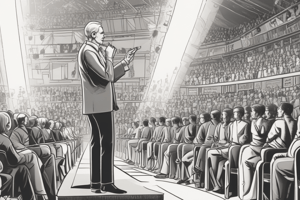Podcast
Questions and Answers
Which of the following is NOT a type of motor skill?
Which of the following is NOT a type of motor skill?
- Moving self and objects
- Interpreting social cues (correct)
- Obtaining and holding objects
- Positioning the body
Which grip involves using the thumb and index finger?
Which grip involves using the thumb and index finger?
- Cylindrical grip
- Spherical grip
- Lateral grip
- Pincer grip (correct)
Which of the following is NOT a process skill?
Which of the following is NOT a process skill?
- Organizing timing
- Sustaining performance
- Applying knowledge
- Interpreting body language (correct)
Which social interaction skill involves starting or ending a social exchange?
Which social interaction skill involves starting or ending a social exchange?
In the performance analysis for playing catch, which process skill was NOT demonstrated?
In the performance analysis for playing catch, which process skill was NOT demonstrated?
Which social interaction skill involves taking turns in a conversation?
Which social interaction skill involves taking turns in a conversation?
Which of the following is a physical skill that supports social interaction?
Which of the following is a physical skill that supports social interaction?
What type of skills are process skills reliant on?
What type of skills are process skills reliant on?
Which of the following statements about performance skills is true?
Which of the following statements about performance skills is true?
Flashcards are hidden until you start studying
Study Notes
Performance Skills
- Demonstrated through actions, can be learned and improved over time, and are observable.
- Supported by body functions and body structures, contributing to a person's ability to perform an activity.
Motor Skills
- Observed as a person interacts with and moves objects and self around the environment.
- Influenced by objects and their properties.
- Includes:
- Positioning the body: aligning, stabilizing, and positioning.
- Obtaining and holding objects: reaching, bending, gripping, manipulating, and coordinating.
- Moving self and objects: coordinating, moving, lifting, walking, transporting, calibrating, and flowing.
- Sustaining performance: enduring, pacing.
Common Grips
- Cylindrical grip
- Pincer grip
- Spherical grip
- Lateral grip
- Tripod grip
- Hook grip
Process Skills
- Observable actions that require mental functions.
- Includes:
- Sustaining performance: pacing, attending, heeding.
- Applying knowledge: choosing, using, handling, inquiring.
- Organizing timing: initiating, continuing, sequencing, terminating.
- Organizing space and objects: searching/locating, gathering, organizing, restoring, navigating.
- Adapting performance: noticing/responding, adjusting, accommodating, benefiting.
Social Interaction Skills
- Observed during social exchange, reliant on social demands.
- Includes:
- Initiating and terminating social interaction: approaching/starting, concluding/disengaging.
- Producing social interaction: producing speech, gesticulating, speaking fluently.
- Physically supporting social interaction: turning toward, looking, placing self, touching, regulating.
- Shaping content of social interaction: questioning, replying, disclosing, expressing emotion, disagreeing, thanking.
- Maintaining flow of social interaction: transitioning, timing response, timing duration, taking turns.
- Verbally supporting social interaction: matching language, clarifying, acknowledging and encouraging, empathizing.
- Adapting social interaction: heeding, accommodating, benefiting.
Studying That Suits You
Use AI to generate personalized quizzes and flashcards to suit your learning preferences.




